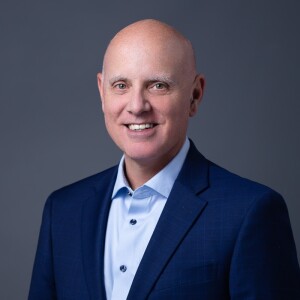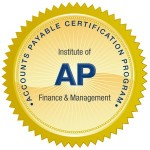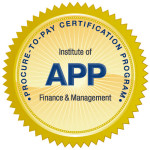
- Membership
- Certification
- Events
- Community
- About
- Help
Unclaimed property expert Jim Sadik talks compliance with IOFM Content Manager Grace Chlosta in this interesting podcast on a topic that impacts most businesses. Organizations usually have at least some uncashed checks or credit balances that need to be managed in accordance with unclaimed property laws, but how they choose to handle them varies. Some companies are strongly motivated to not have to escheat property to the state; others are perfectly happy to escheat the money and let the state handle finding the owner.
Practices vary, notes Sadik. The required due diligence of sending a notification letter may not yield much in the way of results. And simply voiding and reissuing checks to see if the payments will clear on a second attempt creates some potential issues. This tactic requires stringent controls to be certain duplicate payments aren’t made, and can make state unclaimed property auditors suspicious if they detect practices that make it appear as though a company is trying to extend the holding period before escheatment becomes necessary.
Sadik addresses various approaches to resolving unclaimed property issues prior to escheatment, advising that overall, “Any early intervention is better than waiting for a trail to go cold.”

Jim Sadik
Principal, Baker Tilly U.S., LLP
For the past 36 years, Jim Sadik has assisted organizations of all sizes with their unclaimed property consulting and compliance reporting needs. He presently assists companies with staying in regular compliance with the unclaimed property regulations in all 54 reporting jurisdictions, and also provides financial, accounting, operational, and technical guidance when companies are undergoing multistate unclaimed property examinations. In addition, Jim assists many first-time filing companies in understanding the risks and benefits associated with the various state-level voluntary disclosure programs. His prior experiences working as a state contract auditor gives Jim a practical view on how holders and regulators can often resolve complex issues, which benefit not only the states and companies, but also the true owners of the unclaimed property. With a wide range of experiences in industries and topics including all types of insurance, banking and brokerage, gift cards and rebates, healthcare and health services, general corporate payables and credits, and retirement assets, Jim shares perspectives with the IOFM community on practically any unclaimed property topic, through his frequent attendance as an exhibitor at APP2P conference events, through occasional webinars, and as a contributor to IOFM’s “Ask the Expert” portal.

Grace Chlosta
Content Manager, IOFM
Grace Chlosta joined the Institute of Finance & Management (IOFM) in 2022 in a new role for the team as the Content Manager. She is responsible for the planning, organization, development, and implementation of all the content for IOFM’s digital products and (virtual and in-person) events. Grace is committed to ensuring that IOFM’s content stays timely, relevant, and actionable for all financial operations professionals, and works closely with a team of content developers, industry leaders, and subject matter experts to guarantee this happens.
Grace Chlosta: Welcome to the IOFM podcast. This is a podcast for accounts payable and accounts receivable professionals who want to stay in the know with current AP and AR trends and ideas. We'll be interviewing professionals in this space on a wide variety of subjects, including automation, artificial intelligence, career growth, compliance, leadership, and much more.
Today we have an interview with Jim Sadik, Principal at Baker Tilly US. For the past 36 years, Jim has assisted organizations of all sizes with their unclaimed property consulting and compliance-reporting needs. He presently assists companies with staying in regular compliance with the Unclaimed Property Regulations in all 54 reporting jurisdictions, and also provides financial, accounting, operational, and technical guidance when companies are undergoing multistate unclaimed property examinations.
00:00:57
In addition, Jim assists many first-time filing companies in understanding the risks and benefits associated with the various state-level voluntary disclosure programs. His prior experience working as a state contractor gives Jim a practical view on how holders and regulators can often resolve complex issues, which benefit not only the states and companies, but also the true owners of the unclaimed property.
With a wide range of experiences in industries and topics, including all types of insurance, banking and brokerage, gift cards and rebates, healthcare and health services, general corporate payables and credits, and retirement assets, Jim shares perspectives with the IOFM community on practically any unclaimed property topic through his frequent attendance as an exhibitor at AP P2P conference events, through occasional webinars, and as a contributor to IOFM's "Ask the Expert" Portal. Today he'll be interviewed by me, Grace Chlosta, Content Manager at IOFM.
00:01:54
I joined the Institute of Finance and Management in 2022 in a new role for our team as the content manager. I'm responsible for the planning, organization, development, and implementation of all content for IOFM's digital products and virtual and in-person events. I'm committed to ensuring that IOFM's content stays timely, relevant, and actionable for all financial operations professionals, and work closely with a team of content developers, industry leaders, and subject matter experts to guarantee this happens.
All right, we have Jim with us. How you doing today, Jim?
00:02:29
Jim Sadik: I am doing great, Grace. How about you?
Grace Chlosta: I am doing good. Thank you so much for coming on the podcast. We're super excited to get started on this conversation on unclaimed property today.
Jim Sadik: Well, thank you for having me back. It's always a pleasure to talk to you and your colleagues.
Grace Chlosta: Yeah, absolutely. We have a lot to get through today, so let's get right into it. Kind of talking about when you hear about unclaimed property at conferences, or from IOFM, the focus is usually on the risks of non-reporting or the enforcement efforts used by the states to kind of collect property, but we don't talk much about the public policy side of things and how these programs are really meant to be about consumer protection.
00:03:10
So with billions of dollars of property in the hands of the states already, what can we do to return property to actual owners more frequently and kind of before it's turned over in the first place?
Jim Sadik: Well, Grace, your question puts the focus on getting money into the hands of the people who really should've had it in the first place. When we're a company, we're talking about our customers, our vendors, suppliers, and in some cases even our own employees. Payments for any number of reasons are forgotten about. They're disregarded, they're lost, or sometimes never received in the first place. Yet the actual ownership of the property, who it belongs to, is generally not in dispute.
00:04:03
With so much money changing hands, one could ask: Can a better job be done to return it to the owners? Now, on one hand, you've got the states, who estimate that they're holding somewhere north of $50 billion in unclaimed property. At the same time, the states recently indicated that during one particular year that they looked at, they collectively returned over four billion dollars to owners. They categorized that return as a 70% return of the value that they collected. Do a little rough math there, and it indicates that the states property collected somewhere north of six billion dollars over that same single-year period.
00:04:51
Now imagine the economic benefit if that money got to the owners in the first place, and those funds were used in the normal course of business. So maybe this is not exactly this giant stimulus of sorts, but when I think about unclaimed property, I think about the velocity of that money slowing down, not speeding up, so giving it back sooner is always going to be better than later.
Grace Chlosta: Yeah, that's a really great point. Kind of talking about the process of returning money, I see and hear about efforts by states all over in print, on the radio, on television. What do businesses do? Or better yet, what are they supposed to do to return property? It's not like individual companies are out there advertising or conducting publicly visible activities beyond directly communicating with their own customers and vendors. So what are companies required to do, and what could they reasonably do?
00:05:50
Jim Sadik: Yeah, all those public-service announcements from the state, they can be quite effective. I feel like I can't go a day without seeing "FindMassMoney.gov" TV commercials or hearing the same advertisement. Yes, I'm a Massachusetts resident. Or hearing the same advertisement on a Boston radio station when I get in my car. And you know what? That advertising works. No joke – last week, I looked up my own name and I found $4.06. It wasn't there last year or the year before, but there I was. Literally within a minute, I completed a very simple claims process online. Soon, I'm going to have the $4.06.
00:06:46
Not exactly life-changing, is it? But the media platform is used effectively. You couldn't say that states aren't making efforts to go directly to consumers to get the word out. They want to return the money. The PR is good for the state. And by the way, one of the primary purposes for them collecting the money is to be able to return it.
Let's back up a second and address the holders' obligations to conduct outreach (not the states'), the minimum requirements, and also how else contact can be made.
Grace Chlosta: So are you kind of talking about the due diligence process? I've seen some of those letters. Honestly, they don't always grab your attention. They have non-descript envelopes, little to no identifying features, and, in some cases, they're kind of like junk mail that is pretty easily skipped over, I feel like.
Jim Sadik: Yeah, that term can mean many things, due diligence. But in unclaimed property it refers to the statutory mailing requirements prior to the reporting. Maybe let's call it a requisite effort, what's required that must be made in order to prompt a response from an owner – most often in the form of a first-class letter sent through the postal service with little flare and not much time in the form of a response window to actually answer the letter.
00:08:20
It's really just offering enough context for someone actually opening that letter to read it and think about what it means.
Grace Chlosta: Do those letters generate the kind of response that holders hope for? Don't companies just kind of want people to respond in order to get payments reissued?
Jim Sadik: I suppose that in the abstract companies would prefer to always pay any obligation that they acknowledge in their accounting records and not report anything to the states. So, yeah, I suppose a 100% response rate to outreach effort would be preferable. But as a practical matter, people take different views on whether they should do more and do it sooner and at what cost.
00:09:11
Grace Chlosta: Right. Why not just reissue checks once they're stale-dated, just to see if recipients deposit them the second time around?
Jim Sadik: That is a very interesting tactic, Grace. I'm glad you brought that up. I guess the controls around how checks are voided, the voiding process within a company, would be critical to avoid double-paying. You don't want to reissue a check without voiding the first one. But if it resulted in the new item clearing, then I suppose it would have some benefit.
Auditors, on the other hand, would look at the first-issuance date in instances where even the replacement check didn't clear the bank. The void/reissuance recordkeeping process would have to be pretty structured.
00:10:04
Skeptics of this practice would point to the possibility that a company would engage in some sort of massive group voiding of large numbers of aged checks, reissue all of them, and thus have the effect of sort of visually rolling up the transaction date to a more recent time, and then further project out into the future the date when the items might become reportable. Now, there's no evidence of this tactic being used as an audit defense mechanisms, but agents of the state – contract auditors in particular – do pay attention to the voiding practices, and they do look for patterns that may suggest a non-standard business practice.
00:10:53
But in summary, again, if reissuing a check leads to the cashing of a check, it's one less item we have to worry about down the road.
Grace Chlosta: Okay, got it. What about mailing a reminder letter out of courtesy much earlier than the due diligence letter and sort of nudging people to cash their checks. Wouldn't you expect that people who have received those letters sooner, rather than later, would maybe be more likely to pay attention and be a bit more curious? I know that if someone sent me a letter and they were trying to give me money, I'd be a little bit interested in seeing what it was all about.
Jim Sadik: Well, any early intervention is better than waiting for a trail to go cold. Companies relocate, individuals change their places of residents. The sooner you try to contact someone where they were last known to reside, your chances are always going to be better that you're going to make contact.
00:11:50
But then you have to address again the cost. We talk a lot about costs in business, and this is yet another one. The cost may seem small. Postage and materials, the costs involved with generating and sending the mail, not to mention what's involved with receiving and tracking the responses. If a positive response is received, you're going to have to reissue that check anyway. It really comes down to how a company feels about reporting the unclaimed property. Some feel that once the obligation is owed, who cares who cashes the check? You're only going to pay it once and a company giving it to the state – it doesn't make much difference, provided they aren't paying it twice. Some just feel that we should report it and let the state get it back.
00:12:47
Then there's the flipside view. There are companies that will move heaven and earth to not report, to try to return everything at any cost, and not let the state have anything. I suppose that if efforts are made to return property regardless of the motivation, then, again, the more of that that goes on, the better.
Grace Chlosta: Okay, so statutory due diligence is only so effective, basically. So reissuing checks and sending courtesy letters may generate some activity sooner, but the holder then has to absorb the added administrative costs of getting people to take their money. So are there any industries that have pursued other means to pay owners or ways to contact owners in order to lessen the unclaimed property volumes? I guess I'm just kind of wondering about strategies and tactics that are either required as well as voluntary.
00:13:41
Jim Sadik: Yeah, good question. So little is actually required as it relates to the unclaimed property laws themselves. We've gotten into these due diligence mailing requirements. Beyond that, it's fairly silent what you need to do, but you can do almost anything. As an old league colleague of mine once said, "They really just want you to give it the old college try and mail a letter." That was his quote.
Now, granted, a few states do require certified letter in limited instances. Let's make that clear. And while that approach feels somewhat more likely to at least confirm receipt, when people see the cost involved, they don't pursue doing certified mailings any more than what is necessary.
Let's talk about some notable requirements, actual requirements in certain regulated industries which do have an indirect unclaimed property impact. Namely, you have the securities industry, where the Securities Exchange Commission long ago, back in the 1990s, began to mandate that undeliverable security owners, followed by undeliverable brokerage account holders, and what they refer to as "unresponsive payees," people who don't cash disbursement checks, these owners have to be searched to determine whether a more recent or a better address can be located, with the industry then adopting their own procedures to try and contact account owners at these supposed new addresses.
00:15:28
So the electronic database search that's done, it's fairly cost effective in terms of data gathering, or so I'm told, and the information can then be used to possibly update information to make accounts current. Well, how do they do that? Well, then they revert to sending first-class letters, which I suppose is a technological step backwards, but at least the trail has now warmed up a little bit. You may know where these people are.
00:16:01
Another really good example is the life insurance industry, life and annuities, where insurers were compelled by states to seek out proof of death on policies where no death had been reported. The key here is that, under the policy terms, payments to beneficiaries generally would not be made until notification of death had been received. This new requirement led to similar data-matching exercises, which is now done quarterly by many insurance companies, by the way, to not find a new address for someone but to find proof, via public records, that someone was dead, thus triggering an attempt to locate and pay a beneficiary. These undistributed funds might otherwise have sat idle for decades.
00:16:56
In both cases, the death matching either produced a positive result for the property owners or led to further confirmation that an unclaimed property issue was right under the surface that had to be dealt with. But at least the money was going to move in either case and not just stay where it was.
Grace Chlosta: Right. So I'm kind of thinking beyond these sorts of non-standard methods of prompting activity or creating contact, what about where the property itself is fairly simple, like a vendor or supplier check or a payroll check or a medical reimbursement? Are there any limits imposed on companies regarding how they can try to resolve these potential issues?
Jim Sadik: You can try anything you can imagine to find somebody. As I once said in a presentation: Anyone can be found, even if they're six feet underground. If you think about all of the data that is out there, just waiting to be used, you've got change-of-address notification information at the post office. Sometimes it's a little harder to get, but it's there. Software tools that validate whether an actual address exists in the first place or otherwise it may help cleanse poorly formatted data into something that you could now search.
00:18:28
Credit bureau information may validate a current address. It may confirm where somebody used to live. It may even indicate if a death had been reported. Now, we're not talking hiring private investigators, but really accessing large amounts of data in the most cost-effective way possible.
00:18:52
Think about how much information can be found by a simple Google search. Free services that offer a hint of what might be available in terms of personal information. And then right behind those pay walls, you pay a little bit more, you get a little bit more. Right there probably lies everything needed to either find the person, find out that they're no longer living, and you can probably find out who their next of kin are. We haven't even scratched the surface on social media – the absolute treasure trove of information just sitting there to be accessed on LinkedIn, Facebook, or these other, newer sites that I don't have the skill to use. If a business moved, well, that's probably even easier to figure out.
00:19:47
This really comes down to resource allocation. How hard does a company want to try to reunite owners with property? Beyond that old college try we talked about, that standard due diligence letter, is there really a benefit to returning more money? Companies have to think about what's important but also what's practical and decide whether there's client satisfaction issues in play, vendor relation circumstances, employee relations, or even a reputational risk issue if the property gets reported to a state. What are the costs involved? And then maybe even thinking about targeted large-dollar items first, which would give the appearance of enough success to feel better about what's left to report to the state.
00:20:41
How many resources should this sort of scavenger hunt in reverse really be allowed to take up? I suppose each company needs to assess how important it really is to them to keep unclaimed property from being dropped onto that – think of like a three- to five-year conveyor belt of money on its way to the states. There's truly no best practice, just what feels right at the moment.
One final comment, Grace, to give a bit of a nod to the regulators: It's never a bad time to observe the statutory requirements. The laws do exist with the intent of returning to the money to the rightful owners. States would say: You had your chance to find these people. Now it's our turn.
Grace Chlosta: Sure. So much great information today, Jim. Always really great to chat with you. Thank you so much for being on the podcast. We can't wait to have you back in the future.
Jim Sadik: Grace, so nice to talk to you. I look forward to seeing you soon.
00:21:44
Grace Chlosta: Thank you so much for listening to the IOFM podcast. Remember to head on over to the Member Forum to discuss today's episode and provide ideas for our next one. And to stay up to date on IOFM's current events, both in-person and virtually, head on over to IOFM.com.
Continuing Education Credits available:
Receive 1 CEU per hour of listening time towards IOFM programs:

 Receive 1 CEU per hour of listening time towards maintaining any AP and P2P related program through IOFM! These programs are designed to establish standards for the profession and recognize accounts payable and procure-to-pay professionals who, by possessing related work experience and passing a comprehensive exam, have met stringent requirements for mastering the financial operations body of knowledge.
Receive 1 CEU per hour of listening time towards maintaining any AP and P2P related program through IOFM! These programs are designed to establish standards for the profession and recognize accounts payable and procure-to-pay professionals who, by possessing related work experience and passing a comprehensive exam, have met stringent requirements for mastering the financial operations body of knowledge.
Continuing Education Credits available:
Receive 1 CEU per hour of listening time towards IOFM programs:

 Receive 1 CEU per hour of listening time towards maintaining any AP and P2P related program through IOFM! These programs are designed to establish standards for the profession and recognize accounts payable and procure-to-pay professionals who, by possessing related work experience and passing a comprehensive exam, have met stringent requirements for mastering the financial operations body of knowledge.
Receive 1 CEU per hour of listening time towards maintaining any AP and P2P related program through IOFM! These programs are designed to establish standards for the profession and recognize accounts payable and procure-to-pay professionals who, by possessing related work experience and passing a comprehensive exam, have met stringent requirements for mastering the financial operations body of knowledge.
What are you waiting for?
